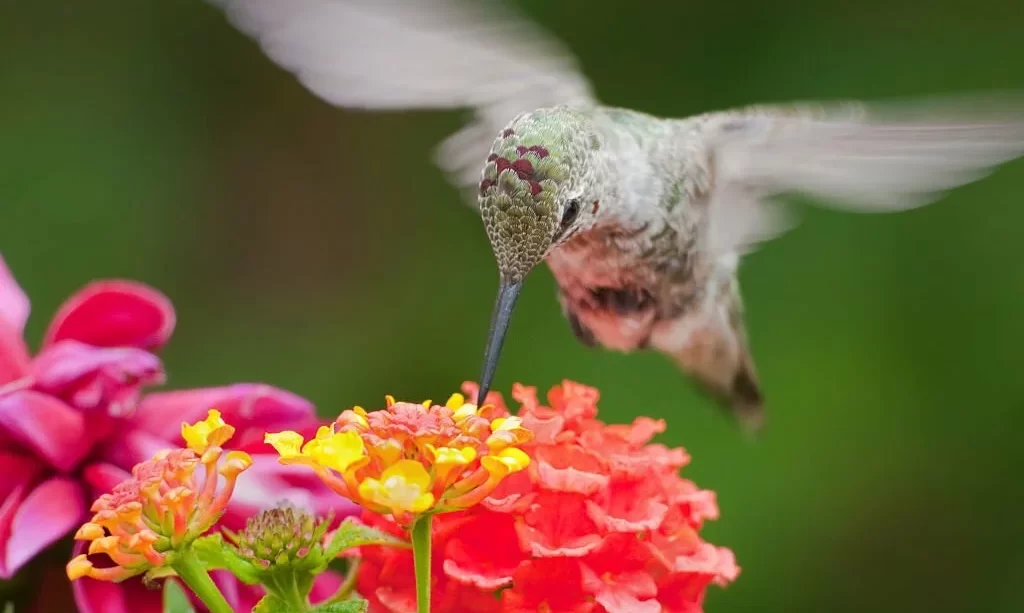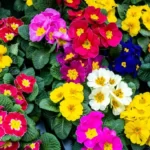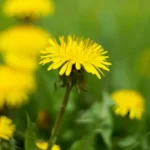Hummingbirds, with their iridescent plumage and extraordinary hovering abilities, are among the most enchanting and charismatic birds in the avian kingdom. These tiny dynamos are not only a delight to observe but also play a critical role as pollinators in the natural world. A common question that arises among bird enthusiasts and gardeners is whether hummingbirds have a particular affinity for lantana plants. In this exploration, we delve into the unique feeding habits of hummingbirds and the characteristics of lantana plants, seeking to unravel the attraction of lantana to these nectar-loving avian gems.
- A perennial producing showy cymes of trumpet flowers that emerge yellow and mature to pink and orange shades, over foliage that is bright green
- a great annual plant for colder climates, perfect for containers
- Cold hardy to zone 7***** Maybe zone 6 with mulch in the winter. If you have an unusually cold winter, you may lose them.
Hummingbird Feeding Habits
To understand the potential appeal of lantana to hummingbirds, it’s crucial to delve into the remarkable feeding habits of these avian wonders. Hummingbirds are renowned for their exclusive diet of nectar obtained from flowers. Their high metabolism demands a constant source of energy, which they derive from the sugary nectar found within blossoms. This dietary specialization necessitates frequent visits to flowers and an innate ability to hover in front of them, using their specialized bills and long, extensible tongues to extract nectar. The intricate relationship between hummingbirds and flowers is not only captivating but also fundamental to the pollination of numerous plant species.
Lantana Plants: Characteristics and Nectar Production
Lantana plants, with their distinctive qualities and vibrant blooms, present an intriguing subject in the context of hummingbird attraction. Lantana is characterized by its sturdy growth, opposite leaves, and clusters of small, tubular flowers. These flowers are known for their rich nectar production, a feature that holds immense significance for nectar-feeding creatures. The striking diversity of lantana’s flower colors, ranging from fiery reds to sunny yellows, can be especially eye-catching. It is these qualities of lantana, particularly its nectar-rich blossoms, that pique the curiosity of those interested in the interplay between hummingbirds and this particular plant species.
- Zones 8 plus – grows up to 6 feet tall.
- Naturally repels mosquitoes while attracting butterflies and hummingbirds
Attracting Hummingbirds with Lantana
The potential allure of lantana plants for hummingbirds lies in their ability to attract these agile avian pollinators. Lantana’s nectar-rich flowers, which brim with the sugary sustenance hummingbirds crave, act as irresistible beacons. The continuous and prolific blooming of lantana can provide a reliable and sustainable food source for hummingbirds, ensuring that these tiny powerhouses find a steady supply of nectar to fuel their high-energy lifestyles. This mutualistic relationship between lantana and hummingbirds not only benefits the birds but also adds a burst of color and life to gardens and landscapes.
Risks and Considerations
While the attraction of lantana to hummingbirds is notable, it’s important to consider potential risks and responsibilities. In some regions, certain lantana species can be invasive and pose a threat to local ecosystems. Responsible gardening practices, such as the selection of non-invasive lantana varieties, are crucial to prevent the spread of these plants in ecologically sensitive areas. Additionally, it’s important to be mindful of lantana’s suitability for different regions and climates. In areas where lantana may not thrive, alternative nectar-rich flowers can be considered to continue attracting hummingbirds while preserving the local environment.
Enhancing the Hummingbird Habitat
For those keen on creating a haven for hummingbirds in their gardens, understanding the appeal of lantana is just the beginning. To enhance the hummingbird habitat, gardeners can take specific steps, including the careful selection and maintenance of lantana plants. Combining lantana with other nectar-rich flowers and strategically placing hummingbird feeders can provide a diverse and accessible food supply for these avian visitors. Furthermore, supporting ethical gardening practices, such as using organic and pesticide-free methods, ensures the well-being of hummingbirds and the health of the broader ecosystem.
- ATTRACTIVE FEEDER: (Set of 2) 10 ounces of nectar in this feeder attract multitudes of hummingbirds to your backyard. 7 flower-shaped feeding ports and perches are arranged in a circular manner for several birds to feed.
- LEAKPROOF RESERVOIR: The mouth of the reservoir tightly screws onto the base, effectively sealing the bird feeder. After filling the container and screwing it onto the base, flip it over; the feeder will not leak even while upside down.
- ANT GUARD FOR HUMMINGBIRD FEEDERS: An ant moat is attached to the top of the feeder. Fill it with water and drive away any approaching bugs. Ensure the nectar you prepared for the hummingbirds is pure and free of any creepy-crawlies.
- ERGONOMIC DESIGN: The wide mouth ensures effortless cleaning and filling, and the 2-part base easily twists apart for an effortlessly thorough cleaning job. Of clear hard plastic, you can monitor nectar levels so you always know when to refill. Hand-wash only; Not dishwasher safe.
- SECURE HANGING: No tools are required! The hummingbird feeder is slipped onto a tree with an s-shaped hook or tightly tethered with a loop rope. (Both are included.) Hang the feeder from a height of 5 feet above ground. enjoy watching the birdies flock.
Conclusion
In conclusion, the question of whether lantana attracts hummingbirds unravels the captivating world of these feathered pollinators and the botanical wonders that entice them. The nectar-rich bounty offered by lantana’s blooms serves as a magnet for hummingbirds, making it a valuable addition to gardens seeking to provide a hospitable habitat for these avian jewels. While the allure of lantana is clear, it is vital to embrace responsible gardening practices, considering potential risks and adopting strategies that foster coexistence with hummingbirds and the preservation of local ecosystems. Understanding the dynamics between lantana and hummingbirds enhances our appreciation of the harmonious interplay between flora and fauna in the natural world.




![Hummingbird Feeder 10 oz [Set of 2] Plastic Feeders for Outdoors, with Built-in Ant Guard - Circular Perch with 5 Feeding Ports - Wide Mouth for Easy Filling/2 Part Base for Easy Cleaning](https://m.media-amazon.com/images/I/41N8NIjdwJL._SL160_.jpg)


